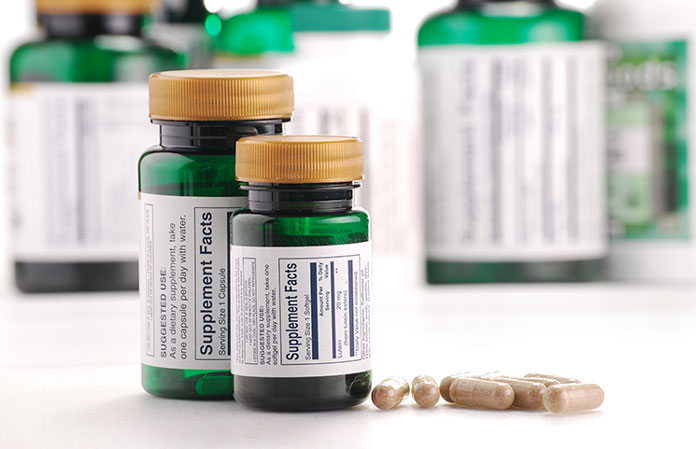Vitamin A is one of the most important vitamins that you have in your body. It serves all sorts of purposes and can be found in many of the foods you already eat. Vitamin A is the vitamin you need for eye care.
While it cannot actually fix many eye problems, it can help with the strength of your eyes. The Beta-Carotene and Retinol found naturally in certain foods will change into the Vitamin A that your body needs.
There are many things to know and consider when it comes to taking Vitamin A in both its natural form and in supplements.
For example, you need to exercise caution when taking Vitamin A if you are over the age of 55, pregnant, nursing, or have certain pre-existing medical conditions. There are also different daily consumptions recommended for different people depending on their needs.
Vitamin A should only be used to supplement your already healthy diet and should not be used in place of a healthy diet.

Vitamin A Dosage
Let’s get started with what the recommended daily dose of Vitamin A is for different people.
It is best to remember that this is simply a suggestion and you should consult with a medical professional before increasing or decreasing the amount of Vitamin A that you consume regularly.
Men have a suggested intake of 1000 mcg daily, while most women should consume closer to 800 mcg. Women who are pregnant should also stay around 800 mcg, but should not go over that as it can cause Vitamin A toxicity.
Women who are nursing or preparing to nurse should increase their normal 800 mcg a day by 500 mcg to compensate for what the baby takes from their body.
If you are planning to nurse, talk with your doctor about how long you should continue on a higher mcg of Vitamin A.
Vitamin A Supplement Forms
Research has indicated that if you want to receive the most benefits from your Vitamin A intake, you should use it in liquid form. Other forms will give you what you need, but you will not receive the same benefits that you would from taking it as a liquid.
There are plenty of supplements on the market today that are in liquid or powder form and can help you better achieve your goals. If you are unsure of the best supplement to take, you can consult with your medical doctor or an employee at a vitamin store.
Vitamin A Food Sources
When it comes to taking your Vitamin A from the foods you are eating, you can liquefy some of the foods while others will need to be eaten in their natural state.
When you are shopping and trying to find the foods with the largest amount of Vitamin A, take a list with you the first few times to make sure you are getting enough items.
There are plenty of natural food sources for Vitamin A and most are probably already in your regular diet. Let’s take a look at them.
- Carrots: This is the most popular form of Vitamin A, and you have more than likely heard to eat carrots for your eyes. Carrots are a great source of Vitamin A and are easy to eat, and you can also juice these for a liquid version.
- Cantaloupe
- Kale
- Liver
- Pumpkin
- Spinach
- Watermelon
- Winter Squash
- Fresh Apricots
There are many more foods that are rich in Vitamin A, but these are the most popular among research participants. The good news for you is, that the majority of these can actually be turned into juice or into a smoothie.
So not only are you getting the Vitamin A that you need, you are getting it in liquid form for the most benefit. It also helps to turn them into smoothies if some of those foods are not your favorite.
You can make a great tasting smoothie with the cantaloupe, kale, apricots, and spinach, for example.

Vitamin A Benefits
Now that you know what type of foods contain Vitamin A, let’s take a look at what Vitamin A can do for your body. While it has many uses, there are some that are more important than others and some that you need on a daily basis.
Eyes
It is no secret that Vitamin A helps with your eyes, but what can it do for you in detail? It can help treat certain eye diseases such as night blindness, glaucoma, and visual purple in the eyes. It can also help to strengthen your overall eye sight.
However, while it will help treat those disorders and disease of your eyes, it will not cure them and should be taken with prescription medication.
Consuming Vitamin A should not be used instead of regular treatment by an eye doctor, as it will not give you the full treatment that you need.
Skin
When taken on a regular basis, Vitamin A can also help you with certain skin issues. If you use a Vitamin A supplement cream or ointment on your skin, you can help to reduce and prevent acne, boils, and even open ulcers.
It can also help with age spots and small skin wounds such as cuts or skin lesions.
Overall Health
When taken on a daily basis, Vitamin A can actually help keep you safe from respiratory infections and boost your immunity. There have been studies that show that Vitamin A can also improve bone growth and can be used as part of a treatment plan for hyperthyroidism.
Keep in mind that when it comes to your overall health, you should consult with your medical doctor before increasing or using Vitamin A as a primary source of treatment.
The majority of people can take Vitamin A as a supplement or added to their regular diet, but there are some people that should make certain that is in their diets.
If you are experiencing excessive amounts of stress on a regular basis, Vitamin A can help to boost your immune system.
When you are under an extreme amount of stress for long periods of time, your immune system can dip to a dangerous level that can leave you exposed to infections and diseases that you may not get normally.
Parents should make sure that children are receiving the right amount of Vitamin A in their diets. Children are more prone to getting respiratory infections and other commonly shared diseases than adults are due to their immature immune systems.
Vitamin A Storage
Before we move on to signs that you have a Vitamin A deficiency, let’s talk briefly about how to store your vitamins once you have purchased them. It is recommended that you refrigerate Vitamin A supplements, as well as the foods that contain Vitamin A.
The reason for this is very simple: heat and humidity can cause the Vitamin A in both the food and supplement to lose its potency. Just like with other types of food, refrigeration can help your Vitamin A foods and supplements last longer.

Vitamin A Deficiency Signs
If you are not positive that you are getting the right amount of Vitamin A in your diet, there are some signs to look for. It is important to remember that you should write them down and bring the list with you to the doctor’s office so you can discuss your symptoms.
- Night Blindness
- Significant changes in your overall eyesight: this should be alerted to your regular eye doctor as quickly as possible. Without treatment, these changes can become permanent.
- Weak tooth enamel: talk with your dentist to make sure that any damages can be repaired.
- Acne
- Slowed or stopped bone growth
- Excessive or unwanted weight loss
- Insomnia and fatigue
While some of these signs may have other underlying causes to them, it is important to be checked by a medical doctor on a regular basis to ensure that nothing more serious is going on.
You will want to make certain that you keep your doctor informed every step of the way with what you are experiencing, so they can help to tailor a plan that works best for you.
No two people with a Vitamin A deficiency are alike, and their treatments will be different, so do not assume that what worked for someone else will work for you.
Vitamin A Overdose Signs
Like with other foods or supplements, too much of a good thing can end up being a bad thing. While you want to make sure that you are getting the right amount of Vitamin A in your system on a daily basis, you don’t want to overdo it.
It is possible to overdose on a Vitamin A supplement or eat too much food rich in Vitamin A. If you are having any of these symptoms, you need to discontinue any Vitamin A supplement and report your symptoms to your doctor immediately.
- Confusion
- Diarrhea
- Double Vision
- Irritability
- Vomiting
- Seizures
- Enlarged liver or spleen
These are serious symptoms and should be treated as such. While some of these symptoms can come from other things, they should not be ignored because of that.
If you feel like these symptoms are the result of too much Vitamin A in your system, contact your doctor or the nearest hospital for help. If left untreated, some of these symptoms could become life threatening and cause serious or permanent damage.
This is why it is vitally important to keep track of your Vitamin A consumption and make sure your doctor knows how much you are taking as well.
Vitamin A Drug Interactions
If you choose to go the supplement route with your Vitamin A consumption, there are a few things to consider. Like with any other supplement, you should speak with your doctor about it first before adding it into your regular routine.
This is vitally important if you are taking any other supplements or prescription medications. Research has indicated that Vitamin A supplements can interact negatively with other medications.
If you are consuming alcohol while taking a Vitamin A supplement, it can decrease the effect the supplement has. Vitamin A supplements can also cause oral birth control to not work as effectively as it should.
It can also decrease Vitamin E and calcium supplements and prevent them from doing their jobs properly.
While talking to your doctor is the best thing you can do when it comes to drug interactions, it doesn’t hurt to do your own research and prepare a list of questions to take with you to your doctor’s appointment.
This will help to keep you informed and give you something to take home. You should not take Vitamin A supplements if they are not all natural or if there is an ingredient included that you have any type of allergic reaction to.
Focus on all natural supplements so you know you are getting the best supplement that you can.
Vitamin A Side Effects
You can experience some side effects when it comes to taking Vitamin A supplements that you won’t experience with food sources.
Research has indicated that some people have experienced hair loss, continued headaches, fevers, and increased irritability while taking Vitamin A supplements.
If you experience any side effect that is outside of normal, you need to speak with your medical doctor and discontinue the supplement as quickly as possible.
More than likely, you will be removed from the Vitamin A supplement and will have to incorporate more of the natural foods into your diet instead.
Vitamin A Summary
While trying to make adjustments to your regular diet can be frustrating, difficult, and long, it is worth it to stick it out. Vitamin A is a necessary vitamin that your body needs in order to function properly and help prevent diseases.
It is important to do your research and talk with your doctor about making changes before you actually implement them. You should make a conscious effort to incorporate the Vitamin A rich foods into your diet before you go looking into supplements.
You are going to benefit more from the natural foods than you are the supplements, and it will be easier in the long run to add the right foods into you diet than it will be to continuously purchase supplements.









